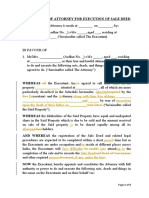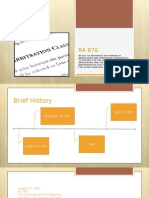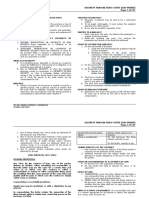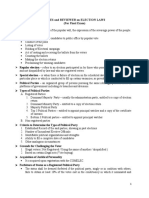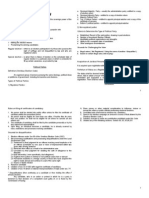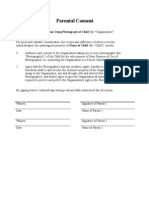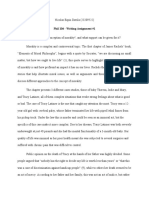Ra 876
Ra 876
Uploaded by
Dandy CruzCopyright:
Available Formats
Ra 876
Ra 876
Uploaded by
Dandy CruzOriginal Title
Copyright
Available Formats
Share this document
Did you find this document useful?
Is this content inappropriate?
Copyright:
Available Formats
Ra 876
Ra 876
Uploaded by
Dandy CruzCopyright:
Available Formats
RA 876. Arbitration Law 1. What is arbitration?
Arbitration has been defined under the ADR Act as a voluntary dispute resolution process in which one or more arbitrators appointed in accordance with the agreement of the parties resolve a dispute by rendering an award. It is a non-adversarial settlement wherein the parties are free to choose the arbitrators that will compose the tribunal, the procedure to be followed in the proceedings, the venue of arbitration, and the substantive law that will govern the proceedings. 2. Benefits of Arbitration:
a. Fast, quick and easy : The number-one benefit of arbitration is that it serves as a forum to
resolve disputes outside of the judicial system. Arbitration can be fast, quick and easy, whereas lawsuits can drag on for years and years. Since the rules of evidence and procedure are usually relaxed in arbitration proceedings, the parties are also in a better position to represent themselves without having to get lawyers involved.
b. Less expensive: It naturally follows that arbitration also tends to be less expensive than
pursuing a lawsuit. While the parties will usually end up having to pay the arbitrator, his or her fees will inevitably be less than the attorneys' fees that they may have to pay to take the same case to trial.
c. Gives parties gliimpse of where things are headed:Even in non-binding arbitration, a
benefit can be that it serves to bridge the gap in an adversarial proceeding so that the parties can get a better glimpse of where things are headed if they are unable to resolve their differences. Most cases settle, but many times it is not until the parties are "on the courthouse steps." Non-binding arbitration may help to facilitate a settlement sooner rather than later.
d. Not bound by strict rules of procedure: Another good thing about arbitration is that an
arbitrator is typically not bound by the strict rules of procedure in reaching a decision. He or she can consider a lot more facts and circumstances than a judge or jury. Arbitrators typically try to be practical and oftentimes look at compromise as being inherently fair. Thus, the likelihood is that an arbitrator's decision will award something to at least one of the parties. However, you would not expect that damages would be awarded that were anywhere near what a jury might have awarded if (and that is a big if) the matter were to have been tried before a jury.
e. Brings finality: Arbitration can also bring finality. Sometimes for the better, a decision on a
binding arbitration cannot be appealed or overturned in the absence of a showing of extraordinary circumstances (for example, fraud, bias or other inappropriate actions on the part of the arbitrator). Thus, once a decision is rendered, the case is over. The losing party will typically not be able to appeal (which can make the matter drag on for years and years).
f. Privacy and confidentiality: Unlike in court litigation, greater confidentiality can be enjoyed
by the parties. 3. Policy to promote arbitration: The constitution provides in Article VIII section 5 par 5 which mandates the Supreme Court to promulgate rules that shall provide a simplified and inexpensive procedure for the speedy disposition of cases. Arbitration proceedings are designed to level the playing field among the parties in pursuit of mutually acceptable solution to their conflicting claims, and any arrangements or scheme that would give undue advantage to a party in negotiating table is anathema to the very purpose of arbitration and should be resisted. 4. Kinds of arbitration:
There are two types of Arbitration: 1. Voluntary Arbitration 2. Compulsory Arbitration Voluntary Arbitration is a binding, adversarial dispute resolution process in which the disputing parties choose one or more arbitrators to hear their dispute and to render a final decision or award after an expedited hearing Voluntary arbitration implies that the two contending parties, unable to compromise their differences by themselves or with the help of mediator or conciliator, agree to submit the conflict/ dispute to an impartial authority, whose decisions they are ready to accept. In other words, under voluntary arbitration the parties to the dispute can and do they refer voluntarily and dispute to arbitration before it is referred for adjudication. This type of reference is known as voluntary reference, for the parties themselves volunteer to come to a settlement though an arbitration machinery. The essential elements in voluntary arbitration are : The voluntary submission of dispute to an arbitrator. The subsequent attendance of witnesses and investigations. The enforcement of an award may not be necessary and binding because there is no compulsion. Voluntary arbitration may be specially needed for disputes arising under agreements. Compulsory Arbitration is a non-binding, adversarial dispute resolution process in which one or more arbitrators hear arguments, weigh evidence and issue a non-binding judgment on the merits after an expedited hearing. The arbitrator's decision addresses only the disputed legal issues and applies legal standards. Either party may reject the ruling and request a trial de novo in court. Compulsory arbitration is one where the parties are required to accept arbitration without any willingness on their part. When one of the parties to an industrial dispute feels aggrieved by an act of the other, it may apply to the appropriate government to refer the dispute to adjudication machinery. Such reference of a dispute is known as compulsory or involuntary reference, because reference in such circumstances does not depend on the sweet will of either the contending parties or any party to the dispute. It is entirely the discretion of the appropriate govt. based on the question of existing dispute, or on the apprehension that industrial dispute will emerge in particular establishment. Under compulsory arbitration, the parties are forced to arbitration by the state when: The parties fail to arrive at a settlement by a voluntary method When there is a national emergency which requires that the wheels of production should not be obstructed by frequent work-stoppages The country is passing through a grave economic crisis There is a grave public dissatisfaction with the existing industrial relations Public interest and the working conditions have to be safeguarded and regulated by the state. Modes of arbitration: 1. For ad hoc arbitration, Philippine law grants the parties the right to select an arbitrator or arbitrators and to choose procedures to govern the proceedings, including rules of arbitration institutions. So long as the main requirement for arbitration, namely consent, is present, the State allows the parties to conduct the arbitration in any manner they stipulate, provided that the arbitration process is not "contrary to law, morals, good customs, public order or public policy." 2. Institutionalized arbitration is conducted through organized bodies such as courts of arbitration, trade associations, and arbitration centers and institutes, each prescribing its own
different arbitration procedure. Foremost among these institutions in the Philippines is the Philippine Dispute Resolution Center Inc. ("PDRCI"). These institutions do not actually participate in settling the dispute but help administer the arbitration and provide a set of rules to govern the proceedings. For international arbitration, the popular institutional rules referred to are those of the International Chamber of Commerce ("ICC"), the Hongkong International Arbitration Centre ("HKIAC") and the Singapore International Arbitration Centre ("SIAC"). 3. Specialized arbitration involves particular industries or kinds of disputes. For example, banking disputes on check clearing are resolved by a specialized system administered under the auspices of the Bankers' Association of the Philippines. In the construction industry, the Construction Industry Arbitration Commission (CIAC) was created in 1985 by Executive Order No. 1008 ("E.O. No. 1008")in recognition of the need for technical expertise to resolve various factual questions in construction disputes. Subject to the agreement of the parties to submit the dispute to voluntary arbitration, the CIAC was given original and exclusive jurisdiction over all construction disputes. Indeed, so comprehensive is the jurisdiction of the CIAC over construction controversies, that it has been decreed that as long as the parties agree to submit to voluntary arbitration, regardless of what forum they may choose, their agreement will fall within the jurisdiction of the CIAC, such that, even if they specifically choose another forum, the parties will not be precluded from electing to submit their dispute before the CIAC because this right has been vested upon each party by law. (This ruling could be reconsidered in the light of the New York Convention to enforce the international arbitration agreements between parties of different nationalities made within a contracting state.) As such, the CIAC has become one of the premier specialized arbitration institutions in the Philippines. F
5. Form of Arbitration Agreement Requisites: Section 4 RA 876 a) It shall be in writing b) Subscribed by the party sought to be charged or by his lawful agent
6. Who may be parties a. Two or more persons or parties to any controversy existing between them at the time of submission which may be the subject of an action b. Parties to a contract with an agreement in such contract to settle by arbitration any controversy thereafter arising between them. Exceptions: a. One of the parties to the controversy is: a.1 infant a.2 person judicially declared to be incompetent Exception to exception: a. Submission to controversy was made by a general guardian or gaurdian adlitem of the infant or incompetent and court approved such petition for permission to submit to arbitration 7. What matters are subject of arbitration a. Controversy arising from contract with arbitration clause b. Any controversy between two or more persons which may be the subject of an action
Includes valuation, appraisals or other controveries which may be collateral, incidental, precedent, subsequent to any issue between the parties. Exceptions: a. Cases subject to jurisdiction of CIR (Court of Industrial Relations)
c.
8. Institution of Arbitration of a dispute how made:
a. In case of a contract to arbitrate future controversies by the service of the other party upon the other of a demand for arbitration in accordance with the contract( in person or by registeredd mail). Contents of demand: - Nature of controversy - Amount involved - Relief sought - True copy of the contract providing for arbitration In case the contract between the parties provides for appointment of a single arbitrator demand shall set forth a specific time within which the parties shall agree upon such arbitrator In case the contract between the parties provides for the appointment of three arbitrators, one to be selected by each party demand shall name the arbitrator appointed by the party making the demanda and shall require that the party upon whom the demand is made shall within fifteen days after the receipt thereof advise in writing the party making such demand of the name of the person appointed by the second party. Two arbitrators shall appoint the third within 10 days form such date or notice. b. In case of an existing controversy to be submitted to arbitration by filing with the clerk of court of CFI having jurisdiction of the submission agreement setting forth nature of cont, amount involved. may be filed by any party 9. Procedure in administered arbitration If in the contract for arbitration or in the submission to arbitration, a provision is made for a method of naming or appointing an arbitrator or arbitrators such method shall be followed. Otherwise, the CFI shall designate an arbitrator or arbitrators. The CFI shall appoint an arbitrator or arbitrators in the following instances: a) If the parties are unable to agree upon a single arbitrator b) If an arbitrator appointed by the parties is unwilling or unable to serve, and his successor has not been appointed in the manner in which he was appointed c) If either party to the contract fails or refuses to name his arbitrator within 15 days after receipt of the demand for arbitration d) If the arbitrators appointed by each party to the contract or appointed by one party to the contract and by the proper Court, shall fail to agree upon or to select the third arbitrator e) Where the agreement is silent as to number of arbitrators in the preceeding cases, the court shall appoint the third arbitrator f) Arbitrators apponted uder this section shall either accept or decline their appointments within seven days of the receipts of their appointements. In case of declination or the failure of an arbitrators to duly accept their appointment the parties or court shall appoint their substitute. 10. Special proceeding to compel arbitration In the event that one party defaults in answering the demand aggrieved party may file with the clerk of court of CFI having jurisdiction over the parties a copy of the demand for arbitration under the contract to arbitrate with a notice that the original demand was sent by registered mail or delivered in person to the party against whom the claim is asserted. Demand shall set forth: - Nature of controversy - Amount involved - Relied sought
Attach true copy of the contract providing for arbitration
11. Remedy for failure or refusal to arbitrate In the event that one party neglects, fails or refuses to arbitrate under a submission agreement the aggrieved party shall serve the other by a demand for arbitration and in case of default file a copy with the clerk of court 12. When court may be involved Sec 6: Failure, neglect or refusal of another to perform under an agreement un writing providing for arbitration gives a right to the aggrieved party to petition the court for an order directing that such arbitration may proceed in the manner set forth in the agreement. -5 days notice of the hearing of such application shall be served to the party in default. -Court shall hear the parties -Court shall order the parties to proceed to arbitration upon being satisfied that the making of the agreement is not an issue - if the making of the agreement is in issue, court shall summarily hear such issue - if the finding is that there is no written arbitration agreement court shall dismiss the proceeding - court has 10 days to resolve motions, petitions heard by it. 13. Enforcement of arbitration agreement Sec 4 par 2 of RA 876 provides that the making of the contract or submission for arbitration of any controversy shall be deemed a consent of the parties to the jurisdiction of the Court of First Instance of the province or City where any of the parties resides, to enforce such contract orsubmission 14. Existence of arbitration agreement In case of a suit arising out of an agreement with arbitration clause, the court in which the suit is pending, upon being satisfied that the suit is referable to arbitration shall stay the action or proceeding until an arbitration has been had. Provided: the applicant for stay is not in default in arbitration proceeding. Toyota Motor Philippines Corp. r. Court of Appeals, G.R. No. 102881, Dec. 7, 1992, 216 SCRA 236. Teresita V. Idolor v. Court of Appeals, et al., G.R. No. 141853, February 7, 200 2 6 China Chiang Jiang Energy Corp. v. Court of Appeals, et al., G.R. No. 125706, Sept. 30, 1996; National Irrigation Administration v. Court of Appeals, CIAC, et al., G.R. No. 129169, Nov. 17, 1999, 318 SCRA 255, 268
You might also like
- Torts - Exam NotesDocument11 pagesTorts - Exam Notesbri100% (3)
- Mcqs Ethics PDFDocument11 pagesMcqs Ethics PDFChikezie Onwukwe77% (13)
- Power of Attorney - DraftDocument4 pagesPower of Attorney - DraftHumanyu KabeerNo ratings yet
- 680 Home Appliances, Inc. v. CA, GR 206599, Sept. 29, 2014, 737Document1 page680 Home Appliances, Inc. v. CA, GR 206599, Sept. 29, 2014, 737Gia DimayugaNo ratings yet
- What Is Poverty - Edited (1) - RevDocument3 pagesWhat Is Poverty - Edited (1) - RevAnthony WambuaNo ratings yet
- Digest 02 Estreller V YsmaelDocument1 pageDigest 02 Estreller V YsmaelRafael SoroNo ratings yet
- A.M. No. 11-1-6-SC Jan 11, 2011Document22 pagesA.M. No. 11-1-6-SC Jan 11, 2011vivivioletteNo ratings yet
- Midterm Reviewer TRANSPO - Updated by AngelDocument18 pagesMidterm Reviewer TRANSPO - Updated by Angellaw abad raNo ratings yet
- PIL Prefi TranscriptDocument28 pagesPIL Prefi TranscriptDennis Aran Tupaz AbrilNo ratings yet
- Rules of Procedure For Environmental CasesDocument16 pagesRules of Procedure For Environmental CasesSheila Mae CabahugNo ratings yet
- RA 876 Consolidated Ver 1Document51 pagesRA 876 Consolidated Ver 1Kaid Maniquis50% (2)
- Sectrans Notes For Finals PDFDocument137 pagesSectrans Notes For Finals PDFjeffdelacruzNo ratings yet
- Special ADR RulesDocument11 pagesSpecial ADR RulesEmmanuel C. DumayasNo ratings yet
- Conflict of LawsDocument92 pagesConflict of LawsMartin JoseNo ratings yet
- Alternative Dispute Resolution - (American Bar Association)Document393 pagesAlternative Dispute Resolution - (American Bar Association)Lester SaquerNo ratings yet
- Credit TransactionDocument24 pagesCredit Transactionmonkey2308100% (1)
- Alternative Dispute ResolutionDocument58 pagesAlternative Dispute ResolutionJP VillasNo ratings yet
- Transpo Reviewer ABM PDFDocument62 pagesTranspo Reviewer ABM PDFAdrian KitNo ratings yet
- Natres Digest Cases 9 16Document11 pagesNatres Digest Cases 9 16amareia yapNo ratings yet
- Notes & Reviewer On Election Laws (For Final Exam)Document15 pagesNotes & Reviewer On Election Laws (For Final Exam)Miguel Anas Jr.100% (1)
- Election LawDocument12 pagesElection LawJoseph Plazo, Ph.DNo ratings yet
- Law On Public Officers: (Continuation of Lessons Taken Before ECQ)Document7 pagesLaw On Public Officers: (Continuation of Lessons Taken Before ECQ)Hermay BanarioNo ratings yet
- Election Law ReviewerDocument43 pagesElection Law ReviewerLouise Ysabel Saclolo100% (4)
- RA 9285 EditedDocument17 pagesRA 9285 EditedAlmayannah Andig AbdulgafforNo ratings yet
- FORM NO. 87 Pledge To Secure An IndebtednessDocument2 pagesFORM NO. 87 Pledge To Secure An IndebtednessAlexandrius Van VailocesNo ratings yet
- Corporation Law ReviewerDocument3 pagesCorporation Law ReviewerchinchayNo ratings yet
- The Law On Alternative Dispute Resolution: Private Justice in The PhilippinesDocument13 pagesThe Law On Alternative Dispute Resolution: Private Justice in The PhilippinesLeoj AnuleNo ratings yet
- ADR United Nations Convention On The Recognition and Enforcement by Atty. Joanne Marie ComaDocument40 pagesADR United Nations Convention On The Recognition and Enforcement by Atty. Joanne Marie ComaKristine Hipolito SerranoNo ratings yet
- Arbit Law - Autea Reviewer (Chap 1-4)Document8 pagesArbit Law - Autea Reviewer (Chap 1-4)Hannah SyNo ratings yet
- Arbitration Law (RA 876)Document21 pagesArbitration Law (RA 876)JamMenesesNo ratings yet
- 10 Hernaez v. Hernaez FullDocument6 pages10 Hernaez v. Hernaez FullJaysieMicabaloNo ratings yet
- Alternative Dispute Resolution CasesDocument66 pagesAlternative Dispute Resolution CasesETHEL JOYCE BAUTISTA. SUMERGIDONo ratings yet
- Special ProceedingsDocument13 pagesSpecial Proceedingskarla126100% (1)
- Agrarian Law and Social Legislation Final Consolidated PDFDocument169 pagesAgrarian Law and Social Legislation Final Consolidated PDFMonica RoqueNo ratings yet
- Contract To Sell Vs Contract of SaleDocument4 pagesContract To Sell Vs Contract of SaleAnonymous Fx5VqHNo ratings yet
- G.R. No. 140179 March 13, 2000 ROQUE FERMO, Petitioner, vs. Commission On Elections and Manuel D. Laxina SR., RespondentsDocument68 pagesG.R. No. 140179 March 13, 2000 ROQUE FERMO, Petitioner, vs. Commission On Elections and Manuel D. Laxina SR., RespondentsNicole Ann Delos ReyesNo ratings yet
- Arbit Case Pile 1Document14 pagesArbit Case Pile 1jinx1147No ratings yet
- ADR Arbitration SyllabusDocument3 pagesADR Arbitration SyllabusJoicel Sopena-BoteNo ratings yet
- Case Digest For Palma Vs GalvezDocument3 pagesCase Digest For Palma Vs Galvezjonms0% (1)
- 7b CREDIT TRANS Chattel MortgagerDocument29 pages7b CREDIT TRANS Chattel MortgagerarielramadaNo ratings yet
- Affidavit of Loss SampleDocument1 pageAffidavit of Loss SampleDranreb AgurrabNo ratings yet
- Negotiable Instruments Act 1881Document40 pagesNegotiable Instruments Act 1881Knt Nallasamy Gounder100% (1)
- Election Final AutosavedDocument24 pagesElection Final AutosavedCnfsr KayceNo ratings yet
- Land Titles and Deeds Case Digest CompilationDocument7 pagesLand Titles and Deeds Case Digest CompilationArdenNo ratings yet
- Barq CompiledDocument36 pagesBarq CompiledPamNo ratings yet
- 1990-2006 Q&A Land Titles and DeedsDocument20 pages1990-2006 Q&A Land Titles and DeedsAnonymous uqBeAy8on100% (1)
- Estate Taxes 2Document56 pagesEstate Taxes 2Patrick TanNo ratings yet
- Election Law ReviewerDocument9 pagesElection Law Reviewersapp0% (1)
- Corrected Updated Explanatory Notes NIRC 1-83Document70 pagesCorrected Updated Explanatory Notes NIRC 1-83RODNA JEMA GREMILLE RE ALENTONNo ratings yet
- Adr LawDocument15 pagesAdr LawLajilaNo ratings yet
- De Guzman Vs Ca Case DigestDocument1 pageDe Guzman Vs Ca Case DigestBrian ThunderNo ratings yet
- SLUP Checklist of Requirements PDFDocument1 pageSLUP Checklist of Requirements PDFelton jay amilaNo ratings yet
- billOfExchange PDFDocument1 pagebillOfExchange PDFgargaaankitNo ratings yet
- ADR Compilation 1Document13 pagesADR Compilation 1Kenneth NonoNo ratings yet
- Agrarian Law and Social LegislationDocument34 pagesAgrarian Law and Social LegislationYulo Vincent Bucayu Panuncio100% (1)
- Diagrams Legitimes PrintableDocument43 pagesDiagrams Legitimes Printablekathryn_kingNo ratings yet
- Natres Law - Rodriguez (2023)Document86 pagesNatres Law - Rodriguez (2023)Manuel A. Rodriguez IINo ratings yet
- Election LawDocument13 pagesElection LawMykee NavalNo ratings yet
- Heirs of Augusto L. Salas, Jr. vs. Laperal Realty Corporationg.R. No. 135362december 13, 1999 (320 SCRA 610)Document2 pagesHeirs of Augusto L. Salas, Jr. vs. Laperal Realty Corporationg.R. No. 135362december 13, 1999 (320 SCRA 610)Jan Jason Guerrero LumanagNo ratings yet
- Alternative Dispute Resolution Midterm ReviewerDocument12 pagesAlternative Dispute Resolution Midterm Reviewerkemsue1224No ratings yet
- Alternative Dispute Resolution CasesDocument63 pagesAlternative Dispute Resolution CasesLisbeth Salander100% (1)
- LAW 160A Alternative Dispute Resolution Prof. Arthur Autea: Class PoliciesDocument76 pagesLAW 160A Alternative Dispute Resolution Prof. Arthur Autea: Class Policiesxalmah100% (6)
- Arbitral Tribunal PROJECTDocument40 pagesArbitral Tribunal PROJECTAnkit Yadav100% (1)
- Arbitration ClauseDocument5 pagesArbitration ClauseAnupama MahajanNo ratings yet
- Breaking The Taboo of Seafarer Mental HealthDocument2 pagesBreaking The Taboo of Seafarer Mental HealthCarlyn Jezza Mae CaliNo ratings yet
- 2020 Parents Consent ASGDocument1 page2020 Parents Consent ASGMasalukot UnoNo ratings yet
- Mike Rinder: Victim Impact Statement Re SaldarriagaDocument4 pagesMike Rinder: Victim Impact Statement Re SaldarriagaTony Ortega100% (1)
- Sample Usufruct AgreementDocument3 pagesSample Usufruct AgreementMarsha Lei Manabat CaringalNo ratings yet
- Bringing The Doll-Merlie M. AlunanDocument3 pagesBringing The Doll-Merlie M. Alunanmichelle anne tayoba86% (7)
- Socio Anthro Prelims ReviewerDocument10 pagesSocio Anthro Prelims ReviewerKarmina SantosNo ratings yet
- Parental Consent For Child To Be PhotographedDocument1 pageParental Consent For Child To Be PhotographedLegal FormsNo ratings yet
- Case Study Report On Labour Unrest at MarutiDocument5 pagesCase Study Report On Labour Unrest at MarutiAyodhya Paikaray100% (6)
- Vital Records Revised Policies Same Sex CouplesDocument2 pagesVital Records Revised Policies Same Sex Couplesdave_dfwNo ratings yet
- Daily Observation Report: Health, Safety & EnvironmentDocument3 pagesDaily Observation Report: Health, Safety & EnvironmentFrancis Enriquez TanNo ratings yet
- Assigment 1 PHILO 104Document10 pagesAssigment 1 PHILO 104Nicolas EspinNo ratings yet
- Kairos Student Application FormDocument7 pagesKairos Student Application FormRosie JonesNo ratings yet
- Abstract Nouns From VerbsDocument9 pagesAbstract Nouns From VerbsAlex McIntyreNo ratings yet
- HTTPS://WWW - Scribd.com/upload-Document?archive Doc 324002400&escape False&metadata ("Context":"archive","page":"read","action":false,"logged In":true,"platform":"web")Document6 pagesHTTPS://WWW - Scribd.com/upload-Document?archive Doc 324002400&escape False&metadata ("Context":"archive","page":"read","action":false,"logged In":true,"platform":"web")Aziz kakarNo ratings yet
- Group 2 Group Activity No. 3 FinalsDocument4 pagesGroup 2 Group Activity No. 3 FinalsDaniella FallaNo ratings yet
- ShafiDocument25 pagesShafiAkira villaresNo ratings yet
- Smart Goals PDFDocument5 pagesSmart Goals PDFAkshay AmbarteNo ratings yet
- Assignment Contract 1-1Document5 pagesAssignment Contract 1-1melanienjoroge0No ratings yet
- GP ESSAYS - Can Terrorism Ever Be JustifiedDocument4 pagesGP ESSAYS - Can Terrorism Ever Be Justifiedbidhan078100% (1)
- What 8Document11 pagesWhat 8bauerjennifer962No ratings yet
- Law of Tort: Trespass To LandDocument8 pagesLaw of Tort: Trespass To LandSophia AcquayeNo ratings yet
- Portfolio - Golden Girls Research PaperDocument12 pagesPortfolio - Golden Girls Research Paperapi-314863611No ratings yet
- Quran Aali Shan Part 3 English by Aurangzaib YousufzaiDocument50 pagesQuran Aali Shan Part 3 English by Aurangzaib Yousufzaii360.pkNo ratings yet
- Debasish Roy V High Court of Calcutta Jan 2019 Cal HCDocument20 pagesDebasish Roy V High Court of Calcutta Jan 2019 Cal HCSubhrajyoti LahiriNo ratings yet
- Drug AbuseDocument2 pagesDrug Abusesara24391No ratings yet
- Condescension - Defendant's Strategy RevealedDocument3 pagesCondescension - Defendant's Strategy Revealedhansley cookNo ratings yet


